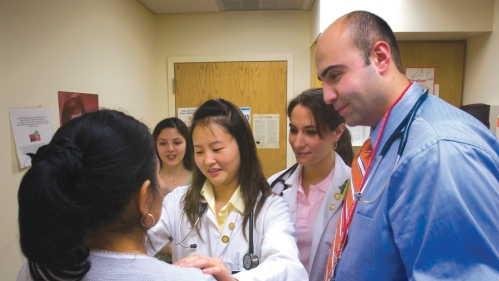
HIPHOP: Promise Clinic
What We Do
Promise Clinic, an initiative of the Homeless and Indigent Population Health Outreach Project (HIPHOP), is an entirely student-run clinic that aims to provide free primary care to the clients of Elijah's Promise Soup Kitchen in New Brunswick. Our patients are uninsured and many are afflicted with common chronic conditions such as hypertension and diabetes.
The Promise Clinic is built upon a continuity of care model. Each new patient is paired with a team of medical students from all levels of training. The assigned student-doctor team is responsible for the patient's care throughout the their time in medical school and/or the patient's stay with clinic, ensuring continuity. Under the close supervision of volunteer attending physicians, medical students are committed to providing an encompassing range of care for our patients.
Our Mission
Promise Clinic is a community of medical students, volunteer physicians, and community partners dedicated to providing patient-centered, quality, primary care services, as well as educating and empowering the clients of Elijah’s Promise Soup Kitchen in New Brunswick to live healthier lives.
Promise Clinic also serves as an environment where medical students and other health professionals can engage in the New Brunswick community through service-learning aimed at teaching the importance of continuity of care, teamwork, advocacy, innovation, and leadership.
Our goals are aligned to the core missions of Robert Wood Johnson Medical School: patient care, education, community service, and research.
What Care Do We Provide?
Promise Clinic provides basic health maintenance, screenings, patient education, access to psychiatric services, on-site dermatology consultations, medications, and basic laboratory work—all free of charge to patients.
Our psychiatric care for non-emergent cases is courtesy of volunteer Robert Wood Johnson Medical School psychiatry resident physicians. We also assist qualifying patients in applying for Charity Care so that they may meet specialty care needs such as optometry, podiatry, endocrinology, cardiology, etc.
Our History
The Promise Clinic was founded in 2005 to provide primary care to New Brunswick citizens while also giving students a chance to excel in medical professionalism using community-based experiences and a long-term care model.
In 2004, our students conducted a needs assessment of health care access problems of Elijah’s Promise Soup Kitchen patrons and found that about one-third of this population did not have a regular source of care. Recognizing this community need and an excellent opportunity to strengthen the medical school’s curriculum and outreach programs, the medical students worked with Elijah’s Promise Inc., St. John’s Family Health Center, the medical school's Senior Associate Dean of Community Health, and 15 faculty members from the Family and Internal Medicine Departments to develop the clinic.
More recently, the clinic has moved to Eric B. Chandler Health Center, expanded its patient population, established additional specialty care resources, and changed its operational aspects to better meet the needs of its patients. The strengths of our organization include:
- Meeting patient’s needs by running evening clinic hours.
- Providing medication cost coverage.
- Facilitating communication between health care and social service providers.
- Giving first- and second-year medical students valuable clinical experience while allowing third- and fourth-year medical students to have the opportunity to teach and guide their team.
- Establishing a continuity of care experience for both patient and student-teams. We have found that patients appreciate a consistency in the care they receive and that this fosters powerful bonds between patients and students.
- Providing an opportunity to conduct community-based participatory research on health conditions, outcomes, and heavily used services of the Promise Clinic patient population.
Annual Reports
Who We Are
Community Partners
Our facilities are graciously loaned to us every week on Thursday evenings from Eric B. Chandler Health Center and we work with Elijah’s Promise Soup Kitchen to register our patient population.
Student Doctors
-
- Dawn Arumemi
- Natasha Auer
- Mina Beshy
- Faith Blamon
- Kavya Boyapati
- Charlotte Brace
- Amy Caffrey
- Sofia Chapman
- Kaustav Chattopadhyay
- Jersey Chen
- Tasnova Choudhury
- Meghana Dantuluri
- Ipek Gozen Eralp
- Andrea Escoto
- Noah Freundlich
- Phil Glaessner
- Ipek Gozen Eralp
- Linda Jung
- Radhika Kadakia
- Nicole Katchur
- Tayra Luisana Keshinover
- Rabia Khan
- Casey Kozak
- Jasmine Lee
- Jeremy Lessing
- Melissa Lopez
- Elyse Machenzie
- Maggie Maniar
- Julianna Martinez
- Emily Marun Herize
- Alysta Paneque
- Pul Park
- Gaurav Pathak
- Annie Pierce
- Aparna Ragupathi
- Michael Rallo
- Henry Resnikoff
- Denay Richards
- Daisy Rodriguez
- Munisa Said
- Charvi Shah
- Ryan Stadler
- Madeline Tchack
- Gina Vargas
- Prem Vyas
- Clairisse Whang
- Lily Wushanley
-
- Dhwani Bharvad
- Maxim Breakstone
- Neha Chauhan
- Ryan Cheng
- Russel Cook
- Jason Daniels
- Annesha Datta
- Anna Dos Santos
- David Eniola
- Ankur Govil
- Edward Gu
- Abigail Gulchin
- Shreya Gupta
- George Hung
- Maya Iglesias
- Isabella Kopits
- Amogh Kudva
- Abisola Lawal
- Oswald Leon
- Elena Lisci
- Ella Lojko
- Joyce Lu
- Erica Lupiano
- Paulina Alexandra Marino Ortiz
- Marissa Millwater
- Parth Modi
- Prachi Parikh
- Radha Patel
- Gabrielle Ro
- Sabeen Rokerya
- Drashya Shah
- Hunter Skroczky
- Sophie Smith
- Rufine Kendra Soh
- Anushka Subrahmanian
- Maharaib Syed
- Sophia TumSuden
- Natalie Vanderveer
- Emily Wang
- Calvin Wang
-
- Hifsa Abbasi
- Lauren Bancalari
- Benjamin Blitz
- Christina Boatwright
- Juliana Cantarutti
- Celeste Cheung
- Daniel ChoAhn
- Katherine Chrisbacher
- Sydney Cook
- Julia Fekete
- Julia Gertie
- Rebecca Greenberg
- Rachel Griep
- Mazen Haifz
- Reece Hefner
- Mohammad Hussein Nehmeh
- Berk Inan
- Genesis Isuiza
- James Keane
- David Kong
- Lucy Lannan
- Christine Lee
- Lillian-Anne Mouwonge-Mukasa
- Risha Patel
- Ria Philip
- Samuel Rosenberg
- Julia Sales
- Harini Srinivasan
- Shareef Syed
- Emily Tasik
- Mansi Thakker
- Farzam Ubaid-Ur Rahman
- Akul Umamageswaran
- Surya Venkatraman
- Gabrielle Vicens
- Sophia Wang
- Alexander Winters
- Joy Xie
- Helen Yang
- Mona Yuan
- Nicolina Zappley
-
- Senna Aldoubosh
- Heba Amer
- Zayna Bajwa
- Cooper Brennan
- Emma Brennan
- Nina Buettner
- Juliann Chu
- Jessica Dai
- Liv Dowling
- Jacqueline Finley
- Lauren Gaetano
- Esteban Hidalgo
- Luke Hixson
- Dimiana Ibrahim
- Disha Jain
- Grace Kern
- Rajat Khurana
- Skylar Kohn
- Lindsey Kuzma
- Michael Lee
- Samantha Lipson
- Ryan Luo
- Heather Martin
- Richard Morales
- Reyna Moreira-Trochez
- Katarzyna Pasciak
- Asha Patel
- Sanjana Putta
- Faith Ricca
- Olivia Sakaguchi
- Medha Satti
- Yuki Schwab
- Matthew Smolka
- Helen Ugalava
- Bhakti Vasani
- Nicolas Vergara
- Arda Yigitkanli
- Allison Zhao
- Daphne Zhu
- Abbey Zidel
-
- Eleanor (Nellie) Agosta
- Aafreen Azmi
- Jenny Ijoma
- Pat Kinley
- Mary Knipper (formerly Bird)
- Anirudh Kulkami
- Isabella Tan
-
- Renad Amer
- Jacob Chacko
- Abanoub Ghabrous
- Alexander Giarretta
- Omar Jaber
- Hyun Jung Kim
- Brett Li
- Aparnaa Muthaiah
- Bhargava Narala
- Parsa Zaman
Steering Committee
-
- Aparna Ragupathi
- Daisy Rodriguez
- Andrea Escoto
- Paulina Marino Ortiz
- Aaron Taveras
- Genesis Isuiza
- Julia Sales
- Sebastian Saenz
- Voke Ajuchi
- Matthew Smolka
- Francis Alvarenga
- Esteban Hidalgo
-
- Amy Caffrey
- Radha Patel
- Brittany Hofferber
- Kithmy Wickramasinghe
- Farzam Rahman
- Adhithi Sreenivasan
- Reyna Moreira-Trochez
- Jacqueline Finley
-
- Kush Patel
- Sydney Wolfe
- Marjorie Rowe
- Michael Mazzariello
-
- Joyce Lu
- Leah Cherukara
- Eileen Hsieh
- Joy Xie
- Heather Martin
-
- Michael Rallo
- Tayra Luisana Keshinover
- Elyse Mackenzie
- Devon Campbell II
- Connor O’Leary
- Elena Lisci
- Meg Joyce
- Julia Gertie
- Daniel ChoAhn
- Andrew Jung
- Allison Zhao
-
Directors
- Eleanor Agosta
- Sid Marwaha
- Afra Trinidad
- Radhika Kadakia
- Jasmine Lee
- Phil Glaessner
Managers
- Henry Noren
- George Hung
- Annesha Datta
Chairs
- Caitlin Deffler
- Julia Fekete
- Helen Yang
First-Year Representatives
- Brianna Moglianesi
- Keerti Boyapati
- Heba Amer
-
- Chloe Cavanaugh
- Svetlana (Lana) Bagdasarov
- Anirudh (Rudy) Krishnan
- Christopher Pella
- Edward Gu
- Marshall Yuan
- Rohan Rao
- Aiden Choi
- Brian Zeng
- Hyerim (Bianca) Nam
-
- Rohit Mukherjee
- Leah Gneco
- Shivani Gokhale
- Gabrielle Ro
- Cathy Yang
- Harini Srinivasan
- Kaja Darien
- Michael Lee
-
- Nath Samaratunga
- Alyssa Miguelino
- Ema Azuonwu
- David Eniola
- Arsala Khan
- Adriana Coman
- Sophia Wang
- Reem Abughannam
- Stefanie Kriel
- Zahra Shahid (SW student)
-
- Seisha Centeno
- Kaitlyn Boyle
- Kevin Hayes
- Aarushi Parikh
- Melissa Suchanek
- Juliana Cantarutti
- Maryam Zafar
- Alyssa Kim
- Asha Patel
- Ishika Kohli
Physician Preceptors
-
- Dr. Karen W. Lin (FM)
- Dr. Eric Jahn (IM)
- Dr. Barbara Jo McGarry (FM)
- Dr. Iris Udasin (IM)
- Dr. Meigra Chin (EM)
- Dr. Fran Yu (FM)
- Dr. Catherine Chen (IM)
- Dr. Janelle Billig (FM)
- Dr. Patrick Wong (FM)
- Dr. Mary O’Connor (IM)
- Dr. Joy Park (FM)
- Dr. Patricia Martin (FM)
- Dr. Yvonne Ye (FM)
- Dr. Annie Truss (FM w/ Dermatology special concentration)
- Family Medicine Residents
- Psychiatry Residents
Contact Us
Hours of Operation
Thursdays, 5:30 p.m.–7:30 p.m.
Clinic Address
Hosted at Eric B. Chandler Health Center
277 George Street
New Brunswick, NJ 08901
Phone: 732-406-9131
Program Mailing Address
The HIPHOP Promise Clinic RWJMS Student Run Healthcare Clinic
Robert Wood Johnson Medical School
675 Hoes Lane, Room N-100 & N-101A
Piscataway, NJ 08854-5635
For Physicians
If you are a physician and are interested in volunteering as a Physician Preceptor at the HIPHOP Promise Clinic, please email Julia Fekete at jf976@rwjms.rutgers.edu.
Clinic Hours and Location
The clinic is open Thursdays, 5:30 p.m.–7:30 p.m.
Eric B. Chandler Health Center
277 George Street
New Brunswick, NJ 08901
Phone: 732-406-9131
Registration
Elijah’s Promise Soup Kitchen
18 Neilson Street
New Brunswick, NJ 08901
Open daily, 11 a.m.–12:30 p.m. One hot meal and snack bag/lunch bag are provided to anyone.
To refer patients, please contact 732-545-9002.
Frequently Asked Questions
Accordion Content
As a free clinic, we are only allowed to serve uninsured patients eligible for Charity Care. Please refer to the FAQs below for more information.
-
- Uninsured patients who are eligible for Charity Care
- Adults: Individuals older than 18 years
- Clients of Elijah’s Promise Soup Kitchen
You must satisfy all three of these requirements. To see if you qualify, please call 732-406-9131 or ask Community Outreach Committee members at the Saturday morning blood pressure screenings at Elijah’s Promise Soup Kitchen.
-
-
Attend blood pressure screening at Elijah’s Promise held on Saturday mornings from 10 a.m.–12 p.m. to be screened for eligibility and set up an initial appointment with Community Outreach Committee members.
-
If you are unable to be screened, contact Patient Recruitment Coordinator Helen Yang at hhy9@rwjms.rutgers.edu to arrange a different screening time. You may also call the Director of Community Services at 732-545-9002, extension 116.
-
We request that you provide some form of contact information (email or phone number) for appointment reminders. It can be yours, that of a family member, or a trusted friend who can easily reach you.
-
-
- Continuous primary medical care, including: management of chronic medical conditions (hypertension, diabetes, etc), acute illnesses (sick visits), preventative medicine and social support.
- Physical examinations, medications vouchers for prescription medication, basic laboratory testing and EKGs.
- Referrals to specific specialty care services through the Specialty Care Committee.
- Psychiatry consults through psychiatry residents.
- Unfortunately, we cannot see pregnant women for prenatal care or patients with HIV. We will be happy to refer patients with HIV to providers who specialize in HIV.
-
- Patient eligibility: Our Patient Recruitment Coordinator Helen Yang can answer these questions for you. Email hhy9@rwjms.rutgers.edu
- Appointments: Schedulers or Communications can confirm or cancel appointments for you. Call 732-406-9131.
Additional Resources for Patients
Accordion Content
Updated October 2023
-
Promise Agriculture
Cost: Free
Coverage area: Middlesex County
Hours: Monday–Friday 8 a.m.–5 p.m.
Address:
52 Tabernacle Way
New Brunswick, NJ 08901
(Garden located across the street from this address.)
Phone: 732-545-9002Unity Square Community Center–Catholic Charities
Cost: Free
Requirements: Identification
Coverage area: Middlesex County
Hours:
Tuesday (by appointment) 10 a.m.–2 p.m.
Friday 11:30 a.m.–1:30 p.m.
Saturday 10 a.m.–1 p.m.
Third Sunday of each month (by appointment)
Address:
81 Remsen Avenue
New Brunswick, NJ 08901
Phone: 732-545-0329 -
Harmony Family Success Center
Cost: Free
Coverage: Middlesex County
Hours:
Monday–Tuesday 9 a.m.–5 p.m.
Wednesday 11 a.m.–7 p.m.
Thursday 9 a.m.–5 p.m.
Friday 9 a.m.–5 p.m.
Address:
255 Livingston Avenue
New Brunswick, NJ 08901
Phone: 732-640-0800Homeless Prevention Rapid Re-Housing
Cost: Free
Requirements: Must have court eviction notice, currently homeless, current annual household income between $21,150-$39,800.
Coverage: Middlesex County
Hours: Monday–Friday 8 a.m.–5 p.m.
Address:
26 Safran Avenue
Edison, NJ 08837
Phone: 732-738-1323 -
Homeless Prevention Rapid Re-Housing
Cost: Free
Requirements: Must have court eviction notice, currently homeless, current annual household income between $21,150-$39,800.
Coverage: Middlesex County
Hours: Monday–Friday 8 a.m.–5 p.m.
Address:
26 Safran Avenue
Edison, NJ 08837
Phone: 732-738-1323Rental and Utility Assistance
Cost: Free
Coverage: Middlesex County
Hours: Monday–Friday 8 a.m.–5 p.m.
Address: Will be given to people who seek assistance
Phone: 732-324-8200 -
Harmony Family Success Center
Cost: Free
Coverage: Middlesex County
Hours:
Monday–Tuesday 9 a.m.–5 p.m.
Wednesday 11 a.m.–7 p.m.
Thursday 9 a.m.–5 p.m.
Friday 9 a.m.–5 p.m.
Address:
255 Livingston Avenue
New Brunswick, NJ 08901
Phone: 732-640-0800New Brunswick Free Public Library
Cost: Free
Hours:
Monday–Thursday 10 a.m.–9 p.m.
Friday 10 a.m.–5 p.m.
Address:
60 Livingston Avenue
New Brunswick NJ 08901
Phone: 732-745-5108 -
Elijah’s Promise
Coverage: Middlesex County
Hours: Monday–Friday 8 a.m.–5 p.m.
Address:
211 Livingston Avenue
New Brunswick, NJ 08901
Phone: 732-545-9002 -
Promise Culinary School
Cost: Reduced cost
Coverage: Middlesex County
Hours: Monday–Friday 8 a.m.–5 p.m.
Address:
211 Livingston Avenue
New Brunswick, NJ 08901
Phone: 732-545-9002Harmony Family Success Center
Cost: Free
Coverage: Middlesex County
Hours:
Monday–Tuesday 9 a.m.–5 p.m.
Wednesday 11 a.m.–7 p.m.
Thursday 9 a.m.–5 p.m.
Friday 9 a.m.–5 p.m.
Address:
255 Livingston Avenue
New Brunswick, NJ 08901
Phone: 732-640-0800 -
Immigration Services Program - Catholic Charities
Cost: Reduced cost; Consultation: $50
Coverage: Middlesex County
Address:
81 Remsen Avenue
New Brunswick, NJ 08901
Phone: 732-545-0329 -
NJ 2-1-1 Partnership
Middlesex County Homeless Hotline Dial 211. You can also reach 2-1-1 by dialing 877-NJ2114U (877-652-1148)
Unity Square Community Center
Address: 81 Remsen Ave, New Brunswick, NJ 08901
Hours: 7 p.m.–7 a.m. as long the temperature has reached 32 degrees and below for two consecutive days
Note: No food and people under the influence allowed
Due to the Covid-19 restrictions, these are the only resources available for Middlesex County at this point in time. This list will continue to be updated as more information becomes available. -
*Websites not operated by Robert Wood Johnson Medical School
Get Involved
Through Promise Clinic, the uninsured and under-served communities of New Brunswick have access to primary health care that they would not otherwise receive. The clinic also serves as an opportunity for early clinical exposure for medical students in their pre-clinical years. We provide not only patient education, but also peer education, as students in their clinical years teach pre-clinical students the basics of the physical exam and management of chronic health conditions.
Program Information and Requirements
-
Volunteering as a student-doctor at the HIPHOP Promise Clinic is a valuable opportunity to gain clinical experience during your pre-clinical years, and to experience continuity of care throughout your time at Robert Wood Johnson Medical School. In a team of four or more students from years 1–4, you will mentor and be mentored about patient care, evidence-based practice, course work, and how to navigate the world of a medical student.
All medical students can apply to be a student-doctor at the beginning of the fall semester.
An open interest meeting will be held in the fall, and information will be available via email. As a student-doctor, one commits to the HIPHOP Promise Clinic until their graduation from the medical school. Medical students can also apply to be on the HIPHOP Promise Clinic Steering Committee, a team dedicated to clinic operations. Interviews for positions on this committee are held during the fall semester.
To volunteer as a student-doctor, you commit to following duties and more:
- Attend each of your patient’s appointments at the HIPHOP Promise Clinic, except in the event of a serious extenuating circumstance such as illness or emergency.
- Attend patient visits for specialty care, diagnostic tests or procedures, as appropriate.
- Continue to participate as a student-doctor, providing continuity of care to your patient, throughout your time at the Piscataway/New Brunswick campus.
- Follow-up with the patient in a timely manner regarding any concerns, questions, laboratory results, or results of other diagnostic tests in consultation with the faculty preceptor.
- Treat each and every patient with respect, compassion, patience, and appropriate, thoughtful health care regardless of ethnicity, gender, race, religion, sexual orientation, nationality, political affiliation, or social standing.
- Work in a professional manner and collaborate cooperatively with your patients, the student-doctor team, physician preceptors and clinic administrators.
- Be aware of your own limitations and reach out to others when you need help.
- Protect patient confidentiality.
- Attend training sessions that will provide you with increased understanding of the issues pertinent to working with a diverse population of indigent, homeless, and uninsured patients in this community, as well as inform you of clinic policies and procedures, and prepare you for your clinical role as a student-doctor.
-
- Students will visit the clinic when their patients visit the clinic at a federally qualified health center: Eric B. Chandler Health Center.
- Patients are paired with groups of three-to-four student-doctors, each from different years of medical school.
- First- and second-year students perform initial intake services, take vital signs and a detailed patient history.
- Third- and fourth-year students perform physical examinations and basic diagnostics.
- Student-doctor teams assist patients with access to social services, specialty care, or inpatient services.
- Volunteer faculty preceptors supervise students and assists with the management decisions and diagnostic tests.
- Students manage a medication voucher program; medications are free and patient assistance programs are utilized for eligible patients.
- Student will assist patients with beginning their process with Charity Care applications (lab tests, imaging studies, emergency care).
- Health workshops are conducted to address topics such as nutrition and exercise.
- Students manage the operation of the clinic (scheduling patients and faculty, etc.).
- All clinical activities are supervised by Robert Wood Johnson Medical School faculty who volunteer precept at the clinic.
-
- Attend at least 1 blood pressure screening at Elijah's Promise Soup Kitchen.
- Attend at least 2 teaching workshops at the medical school.
- Attend Promise Clinic orientation.
- Participate in TeamSTEPPS training.
- Attend all scheduled patient appointments.
-
Communications
-
Manage contact with all Promise Clinic patients, including Spanish-speaking patients
-
Keep in touch with patients regarding appointments and outpatient care, and work closely with clinic schedulers to arrange new patient appointments and follow-up appointments
-
Serve as interpreters for Spanish-speaking patients and recruit others to serve as interpreters through a Student Interpreter Program
Community Outreach
-
Collaborate with Elijah’s Promise Community Kitchen, other community-based partners, and other steering committees to facilitate patient recruitment and ensure patient follow- up
-
Coordinate weekly blood pressure screenings at Elijah’s Promise Community Kitchen and work to improve the health of the population by developing public health education materials and programs
-
Organize clinic-wide interventions to target prevalent diseases by administering and analyzing the annual Patient Demographic Survey and encourage student-doctors to practice preventative medicine
Education
-
Make the Promise Clinic a model learning experience for student-doctors
-
Maintain student attendance records for patient appointments and teaching sessions
-
Act as a liaison between the steering committees and medical school staff regarding student completion of requirements
Fundraising and Finance
-
Manage the clinic budget and monitor fundraising income and expenses
-
Coordinate fundraising efforts within the community with the goal to reach financial sustainability and continue providing patients with free healthcare
Laboratory
-
Manage all lab testing during clinic hours, including blood draws, urine samples, finger stick glucose, and other lab procedures
-
Collaborate with the Middlesex County Department of Health to provide mammography, pap smear, and colon cancer screening for patients through the CEED (Cancer Education and Early Detection) Program
Operations
-
Oversee all Promise Clinic activities as clinic directors, managers, schedulers, and first-year representatives
-
Act as liaisons between steering committees, student-doctors, preceptors, faculty advisors, and clinic staff
-
Manage the flow of clinic weekly and collaborate to realize long-term goals for Promise Clinic
Pharmacy
-
Provide patients with prescriptions and vouchers to obtain medication from a local pharmacy at no cost to the patient
-
Provide onsite assistance to student-doctor teams in reviewing patient medications for potential drug interactions and side effects
-
Guide teams in getting their patients into appropriate Patient Assistance Programs (PAPs)
Quality Improvement
-
Identify and target areas where patient safety at the greatest risk, which includes overall clinic administration and specific team practices
-
Improve the efficiency and production of Promise Clinic by using data from student-doctor visits to implement Best Practices
-
Serve as a central source of information for many Promise Clinic projects
Social Needs
- Collaborate with the Rutgers School of Social Work and student-doctors to identify patients’ social needs, including housing insecurity, food insecurity, and unmet educational needs
- Work with community partners to connect patients with local resources to alleviate these pressures with the goal of improving overall health and wellness
Specialty Care
-
Work to increase the breadth of specialized medical resources available to Promise Clinic patients and to streamline the process of obtaining care
-
Provide student-doctor teams with specialists’ contact information and assist with the Charity Care program onsite
-
-
If you can’t remember where something is, or if you need additional help solving a problem, you may utilize two options: the student-doctor resource folder, or if you don't have access on your OneDrive Account, reach out to our Operations team.
- If you need help, please reach out to senior members of your team, Psychiatry residents on-site, student managers, schedulers, or steering committee members as soon as possible.
- The SAFE-T (Suicide Assessment Five-Step Evaluation and Triage) pocket card is available to download for free from the Suicide Prevention Resource Center website.
- If you need help solving a problem, please reach out to senior members of your team, student managers, schedulers or the appropriate steering committee/operations committee member as soon as possible.
-
If you are having trouble completing Physicianship visit requirements, please contact Education at pc_education@rwjms.rutgers.edu, at least one week in advance so she can arrange for you to temporarily join a team. A physician preceptor must sign off on your off-site activity attendance record at each appointment if you are receiving Physicianship credit. A senior member of your student team may complete the end-of-year evaluation.
-
Our physician preceptors are all on a volunteer basis and without their efforts we could not support our patients.
If you are a physician and are interested in volunteering as a Physician Preceptor at the HIPHOP Promise Clinic, please email Julia Fekete, Operations, at jf976@rwjms.rutgers.edu.
Alumni
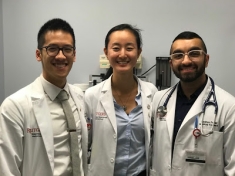
Promise Clinic publishes an annual winter newsletter highlighting alumni achievements within the past year.
If you are interested in sharing your work since graduating from Promise Clinic, or to update your contact information in our alumni database or find contact information for previous Promise Clinic steering committee members or student-doctors, please email Caitlin Deffler, student member of operations, at cyd13@rwjms.rutgers.edu.
Recent News and Announcements
Accordion Content
-
A huge congratulations to the Class of 2023 for matching to their residencies!! We are exceptionally proud of our students, especially with the extraordinary circumstances we’ve all lived through for the past year. YOU MADE IT!!
Though the celebration may be more socially distanced than in previous years, know that all of us at Promise Clinic are celebrating with you in spirit. We have been privileged to witness your growth through your four years at Promise Clinic, and we know you’ll walk into the world with confidence, competence, and compassion as newly-minted physicians.
Thank you all for dedicating a part of your four years in medical school to Promise Clinic and the New Brunswick Community. We could not be happier to see you off on this wonderful journey into residency, and we’re excited to see what bright and inspiring change you bring to this world!
Promise Clinic Match List for Student Doctors (SD) and Steering Committee (SComm) Members
Anesthesiology
- Isaboke Hesbon – Rutgers Robert Wood Johnson Medical School (SD)
- Aditi Master – Rutgers New Jersey Medical School (SD)
- Michael Otoo – ISMMS Mount Sinai Hospital (SD)
Emergency Medicine
- Kelsey Thompson – Harbor-UCLA Medical Center (SD)
Family Medicine
- Saad Mansuri – Rutgers Robert Wood Johnson Medical School (SD)
- Joshua Rowe – Montefiore Medical Center/Einstein (SD & SComm)
General Surgery
- Alexander Cong – University of Hawaii (SD)
- Taylor Corsi – Yale New Haven Hospital (SD)
- Yelizaveta Gribkova – NYP Hospital – Weil Cornell Medical Center (SD)
- Sung Shin Na – Eastern Virginia Medical Center (SD & SComm)
Internal Medicine
- Sarah Abdel-Meguid – Rutgers Robert Wood Johnson Medical School (SD)
- Daniel Bisno – Hospital of the University of Pennsylvania (SD & SComm)
- Kellianne Costello – Rutgers Robert Wood Johnson Medical School (SD)
- Gordon Farley – Hospital of the University of Pennsylvania (SD & SComm)
- Thomas Hanlon – ISMMS Mount Sinai Hospital (SD & SComm)
- Christin Hong – UCLA Medical Center (SD)
Neurology
- Gabrielle Mendes – Thomas Jefferson University (SD)
- Olivia Van Osch – University of Virginia (SD)
Obstetrics & Gynecology
- Tiana Acosta – Temple University Hospital (SD & SComm)
- Gabrielle Bleich – Rutgers Cooperman Barnabas Medical Center (SD)
- Ariana Lyons – Rutgers Robert Wood Johnson Medical School (SD)
Orthopedic Surgery
- Srikaran Kalahasti – Rutgers Robert Wood Johnson Medical School (SD)
- Matthew Weintraub – Mayo Clinic School of Graduate Medical Education (SD)
Pediatrics
- Alexa Altchek – Boston Children’s Hospital (SD)
- Michael Nicolaro – NYP Hospital – Columbia University Medical Center (SD & SComm)
Pediatrics-Primary
- Kayla Moffett – Children’s National Medical Center (SD)
Physical Medicine & Rehabilitation
- Rebecca Howard – ISMMS Mount Sinai Hospital (SD)
Psychiatry
- Amy Matthews – NYP Hospital – Weill Cornell Medical Center/Payne Whitney (SD)
- Olivia Wallden – CMSRU/Cooper University Hospital (SD)
Radiation Oncology
- Tomas Patrich – HCA Healthcare East Florida Division GME/Westside (SD)
Radiology-Diagnostic
- Cavin Qian – Stanford Health Care; MedStar Georgetown University Hospital (SD)
Thoracic Surgery
- Fady Soliman – NYP Hospital – Columbia University Medical Center (SD & SComm)
Vascular Surgery
- Kate Kim – ISMMS Mount Sinai Hospital (SD)
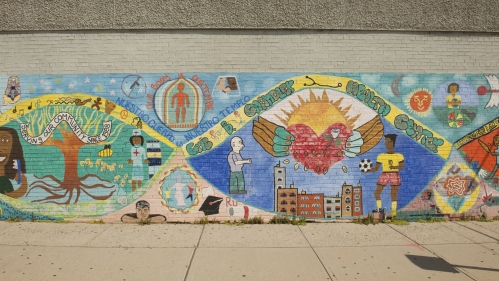
HIPHOP Promise Clinic Newsletter
Check out our annual Promise Clinic newsletter and discover all the amazing things our students doctors and steering committee members have been doing to improve the quality of care and range of services that we can provide for our patients.
Events
Upcoming Events
Event Highlights
Check out photos of our past events and activities.
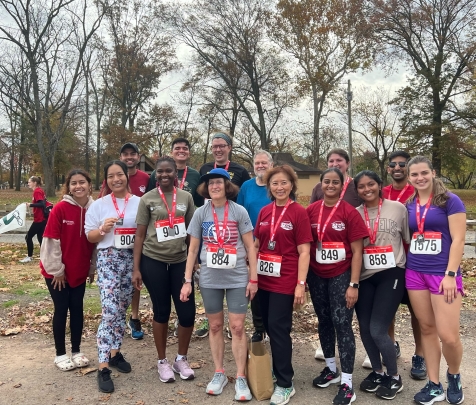
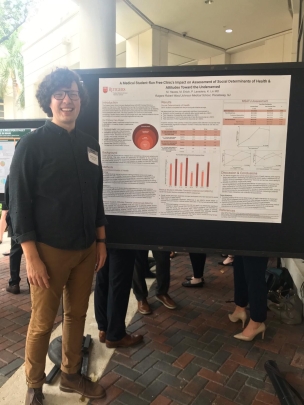

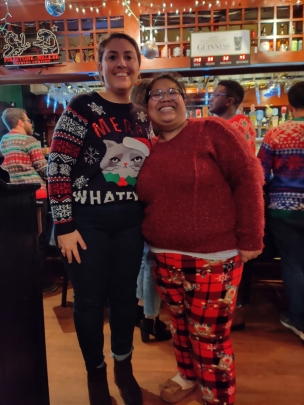
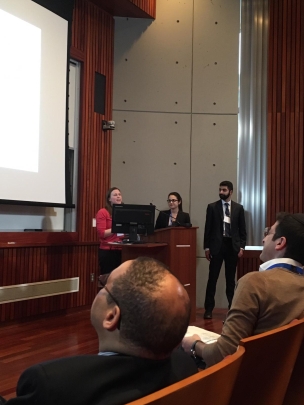
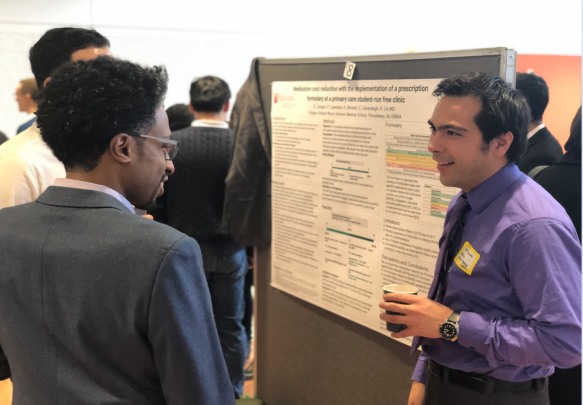
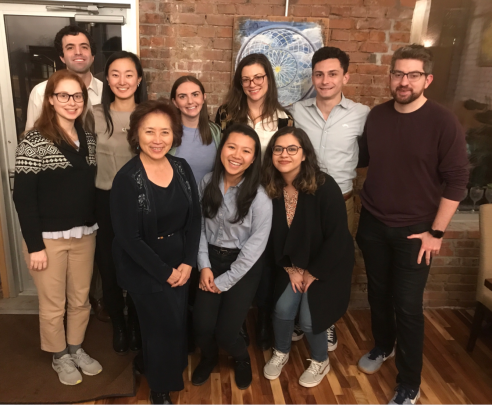
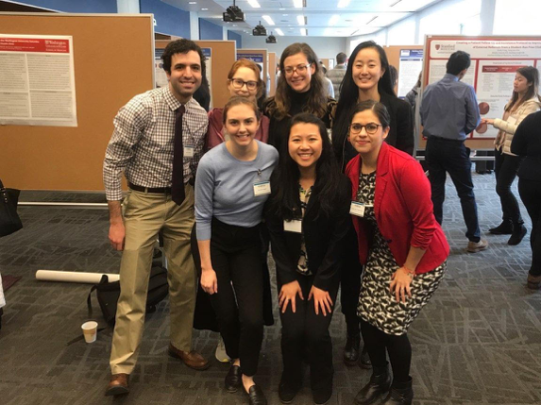
Annual HIPHOP 5K Run 2022
Miami DOCS Community Health Leadership Conference 2019
Promise Clinic Ugly Sweater Night Out–December 2019
Promise Clinic Ugly Sweater Night Out–December 2019
HOPE Symposium 2019–Albert Einstein College of Medicine
Society of Student-Run Free Clinics Conference 2019–Columbia University, New York
Society of Student-Run Free Clinics Annual Conference 2019–Kansas City
Society of Student-Run Free Clinics Annual Conference 2019–Kansas City
Help Us Help Our Patients
The HIPHOP Promise Clinic works with the help of its donors and community partners. We are a community clinic and thus financial support is an important factor in our care efforts. We are very grateful for the various donations we receive because they allow us to improve and expand our services.
Thanks to kind patrons who provided seed funding, we opened the HIPHOP Promise Clinic Endowment fund in 2018 as a step towards becoming financially self-sustaining. Proceeds from our past Keeping the Promise Galas have been used to grow the fund, which will be used to cover essential medical services for patients of Promise Clinic.
Your Donation’s Impact:
$100 – Bronze Sponsorship Prescription Medications for 4 Patients
$250 – Silver Sponsorship Laboratory & Pharmacy Costs for 1 Month of Promise Clinic
$500 – Gold Sponsorship 2 Months of All Clinic Expenses
